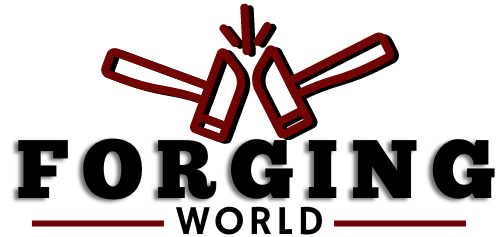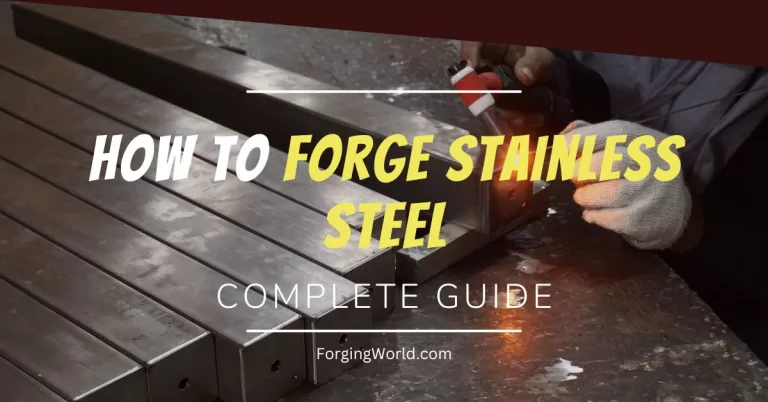As a beginner blacksmith or bladesmith, one of the most important tools in your arsenal is a reliable cross peen hammer.
With so many options available on the market, it can be challenging to determine which one is best suited for your needs.
In this article, we’ll discuss the best cross peen hammers for blacksmithing and knife making, providing you with practical tips, advice, and examples to help you make an informed decision.
Let’s dive in and explore the world of cross peen hammers!
| Hammer Name | Weight Range | Hammerhead Material | Handle Material | Notable Features |
|---|---|---|---|---|
| Peddinghaus Swedish Pattern Cross Peen Hammer | 1.5 – 3 lbs | Forged Steel | Wood | Swedish pattern design, excellent balance, and control |
| Picard Blacksmith’s Cross Peen Hammer | 1.5 – 3 lbs | Drop-Forged Steel | Wood | Ergonomically designed handle, durable |
| Estwing Cross Peen Hammer | 1.5 – 3 lbs | Forged Steel | Steel | One-piece construction, shock reduction grip |
| Stanley FatMax Cross Peen Hammer | 1.5 – 3 lbs | Forged Steel | Steel | One-piece construction, overstrike protection, ergonomic handle |
| Vaughan Cross Peen Hammer | 1.5 – 3 lbs | High-Quality Steel | Wood | Polished face, excellent balance, and control |
Top Cross Peen Hammers for Beginners
Let’s take a closer look at the top cross peen hammers for blacksmithing and knife making, along with their unique features and what makes each one stand out.
1. Peddinghaus Swedish Pattern Cross Peen Hammer
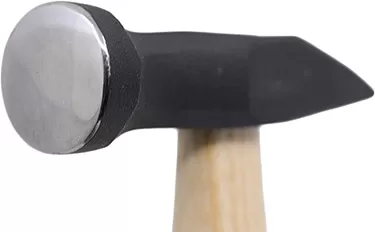
Renowned for its exceptional quality and durability, this hammer boasts a Swedish pattern design that provides excellent balance and control, making it an ideal choice for beginners and experienced blacksmiths alike.
The forged steel head ensures long-lasting performance, while the wooden handle provides a comfortable grip.
This hammer is best suited for general blacksmithing tasks and precision work, thanks to its well-balanced design and versatility.
2. Picard Blacksmiths’ Hammer, Cross Peen
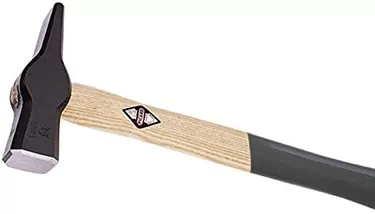
With a reputation for producing high-quality tools, Picard delivers yet another great option for blacksmiths and bladesmiths.
This cross peen hammer features a drop-forged steel head, providing excellent durability and performance. The wooden handle is ergonomically designed for comfort and control during use.
This hammer is ideal for forging and shaping metal, particularly when working with large and heavy workpieces, due to its robust construction and ergonomic design.
3. Estwing Cross Peen Hammer
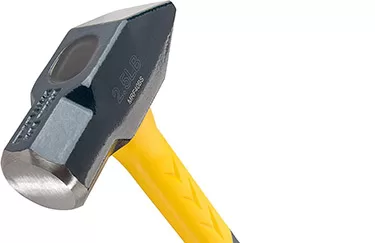
Known for its solid one-piece construction, the Estwing Cross Peen Hammer offers outstanding durability and performance.
The forged steel head and handle are virtually indestructible, while the patented shock reduction grip reduces impact vibrations, making it easier on your hands during extended use.
This hammer is best for those who value durability and are looking for a reliable option for a wide range of blacksmithing and knife-making tasks.
4. Stanley FatMax Cross Peen Hammer
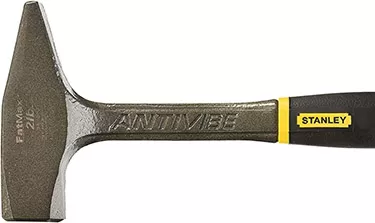
This cross peen hammer from Stanley features a one-piece forged steel construction for added strength and durability.
The hammerhead design offers excellent balance, while the ergonomic handle provides a comfortable grip. An added bonus is the built-in overstrike protection, which helps prevent handle damage from mis-hits.
This hammer is perfect for those who need a versatile option for various tasks, from shaping and forming to riveting and chiseling.
5. Vaughan Cross Peen Hammer
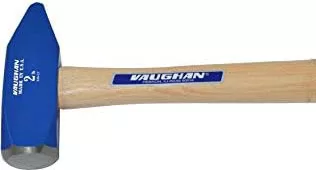
Vaughan offers a range of cross peen hammers suitable for blacksmithing and knife making. Their hammers are made from high-quality steel and feature a polished face for improved performance.
The wooden handle provides a comfortable grip, and the hammerhead’s design offers excellent balance and control.
This hammer is ideal for those who need a high-quality option for precision work in knife making and detailed blacksmithing projects.
By taking a closer look at each of these top cross peen hammers, you can better understand their unique features and benefits. This will help you choose the perfect hammer for your specific blacksmithing or knife-making needs, ensuring you have the right tool for the job.
Factors to Consider When Choosing a Cross Peen Hammer
When selecting the perfect cross peen hammer for your needs, consider the following factors:
- Weight: Choose a hammer weight that allows you to maintain control and reduce fatigue during extended use. As a beginner, starting with a lighter hammer (1.5 to 2 pounds) is recommended.
- Material: Opt for high-quality steel for the hammerhead, as it offers excellent durability and resistance to wear. Our guide on the best steels for making hammers provides more information on different steel types.
- Handle: Select a comfortable and durable handle material, such as wood, fiberglass, or steel. For more information on customizing hammer handles, check out our custom hammer handle guide.
- Balance and Ergonomics: A well-balanced and ergonomically designed hammer ensures proper control and reduced fatigue during use.
- Budget and Quality: Invest in a high-quality cross peen hammer that suits your budget and offers long-lasting performance.
For more information on choosing the right cross peen hammer, refer to our comprehensive guide on how to choose the right cross peen hammer.
Frequently Asked Questions
A cross peen hammer is primarily used for shaping and manipulating metal in blacksmithing and knife making. The flat face of the hammer is used for general forging and flattening, while the peen (the wedge-shaped side) is ideal for spreading and drawing out metal, creating fuller lines, and working in tight spaces.
The ideal weight of a cross peen hammer depends on your skill level and the tasks you plan to perform. For beginners, a lighter hammer (1.5 to 2 pounds) is recommended to help develop proper control and technique. As your skills progress and you work on larger projects, you may find heavier hammers (2.5 to 4 pounds) more suitable for your needs.
Each handle material has its pros and cons:
Wooden handles are traditional, provide good shock absorption, and can be replaced easily. However, they may break or wear down over time.
Fiberglass handles are lightweight, durable, and offer excellent shock absorption. They are less likely to break than wooden handles but may be more challenging to replace.
Steel handles are exceptionally durable and long-lasting. However, they may transfer more shock to your hands during use and can be heavier than other handle options.
Consider your personal preferences and the type of work you’ll be doing when selecting a handle material.
To maintain your cross peen hammer, regularly inspect it for any damage or wear. Keep the hammerhead clean and free from rust by applying a light coat of oil or rust inhibitor. For wooden handles, occasionally sand down any rough spots and apply a protective finish, such as linseed oil or varnish, to prevent cracking and splitting.
While a cross peen hammer is specifically designed for blacksmithing and knife making, it can also be used for other metalworking tasks, such as riveting, forging decorative elements, and even light chiseling. However, for more specialized work, it’s best to use a hammer specifically designed for the task at hand, such as a rounding hammer or a straight peen hammer.
Final Thoughts
With this comparison guide and the factors to consider in mind, you’re now equipped to make an informed decision on the best cross peen hammer for your blacksmithing and knife making needs. Happy forging!
